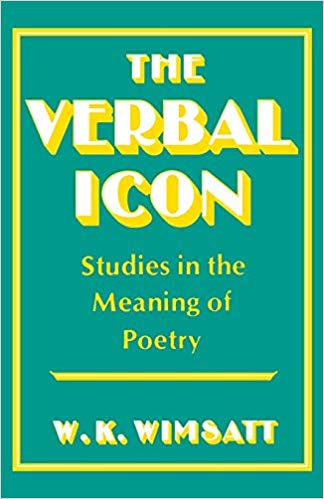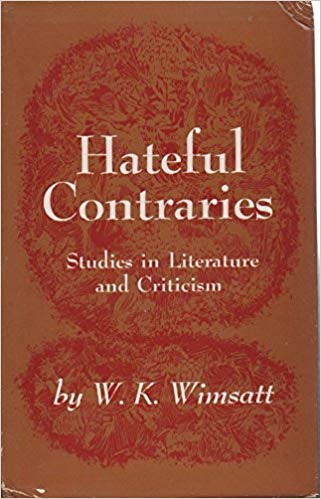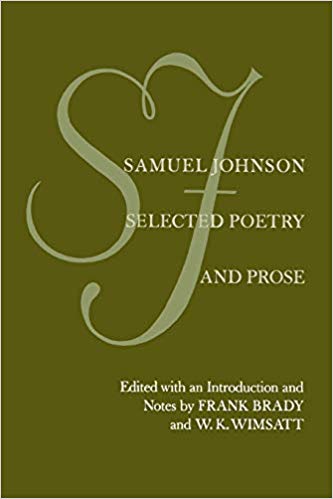Background
William Kurtz Wimsatt Jr. was born on November 17, 1907, in Washington, District of Columbia, United States. He was a son of William Kurtz Wimsatt and Bertha (McSherry) Wimsatt.

3700 O St NW, Washington, DC 20057, United States
In 1928, William graduated from Georgetown University with a Bachelor of Arts degree summa cum laude.
620 Michigan Ave NE, Washington, DC 20064, United States
In 1929, Wimsatt got a Master of Arts degree from the Catholic University of America.
Yale University, New Haven, CT 06520, United States
In 1939, Wimsatt attained a Doctor of Philosophy degree in English Literature from Yale University.






(The sixteen essays in this volume form a series of relate...)
The sixteen essays in this volume form a series of related focuses upon various levels and areas of literary criticism.
https://www.amazon.com/Verbal-Icon-Studies-Meaning-Poetry/dp/0813101115
1954

(These ten essays, written over a period from 1950 to 1962...)
These ten essays, written over a period from 1950 to 1962, are bound together by their common concern with questions of the meaning of criticism and the larger meaning of literature itself. These difficult questions W.K. Wimsatt treats with characteristic wit and penetration, ranging easily from a broad consideration of principles to incisive comment on individual writers and works.
https://www.amazon.com/Hateful-Contraries-Studies-Literature-Criticism/dp/068505084X/ref=tmm_hrd_swatch_0?_encoding=UTF8&qid=&sr=
1965

(This is a major new selection of Samuel Johnson's best wo...)
This is a major new selection of Samuel Johnson's best work, delightfully introduced by W. K. Wimsatt and scrupulously annotated by Frank Brady and Mr. Wimsatt.
https://www.amazon.com/Samuel-Johnson-Selected-Poetry-Prose/dp/0520035526
1978
critic editor educator theorist author
William Kurtz Wimsatt Jr. was born on November 17, 1907, in Washington, District of Columbia, United States. He was a son of William Kurtz Wimsatt and Bertha (McSherry) Wimsatt.
In 1928, William graduated from Georgetown University with a Bachelor of Arts degree summa cum laude. The following year, in 1929, he got a Master of Arts degree from the Catholic University of America. Later, in 1939, Wimsatt attained a Doctor of Philosophy degree in English Literature from Yale University.
Besides, William received a number of honorary degrees from different universities, including a Doctor of Letters degree from Villanova University in 1962, a Doctor of Letters degree from the University of Notre Dame in 1963, a Doctor of Laws degree from Saint Louis University in 1964, a Doctor of Letters degree from Le Moyne College in 1965 and another Doctor of Letters degree from Kenyon College in 1970.
During the period from 1930 till 1935, William served as head of the English Department at Portsmouth Priory School (present-day Portsmouth Abbey School) in Portsmouth, Rhode Island. In 1939, he joined the English Department at Yale University as an instructor, the post he held till 1943, when he was made an assistant professor. Later, from 1949 till 1955, Wimsatt worked as an associate professor, and as a full professor from 1955 until his death in 1975. Besides, in 1965, he was named Frederick Clifford Ford Professor of English and in 1974, he was made Sterling Professor of English. It's also important to note, that William served on the board of editors at Yale in charge of the publication Boswell's Journals.
As a specialist in the eighteenth-century literature, William wrote or edited a number of significant works on this period, including "The Prose Style of Samuel Johnson" (1941), "Selected Poetry and Prose of Alexander Pope" (1951), "Boswell for the Defense, 1769 - 1774" (1959), "Samuel Johnson on Shakespeare" (1960), "The Portraits of Alexander Pope" (1965) and "Samuel Johnson: Selected Poetry and Prose" (1978).
However, William made his greatest mark as a scholar in the field of literary theory. In 1954, he published, in collaboration with the philosopher Monroe C. Beardsley, a collection of essays, entitled "The Verbal Icon". One of these, "The Intentional Fallacy," represented the high watermark of the reaction against romanticism, and more especially against the biographical approach to literary criticism in twentieth-century literary theory.
Reacting against the approach of the nineteenth-century French critic, Charles-Augustin Sainte-Beuve, who had argued, that one of the principal aims of literary criticism was to discover the man behind the book, Wimsatt and Beardsley maintained, that the poem was a self-sustaining and self-sufficient entity, a verbal icon, that deserved study in its own right. Any meaning, that it might have, was an event, that took place in the mind of the reader. There was no point, when examining a text, in finding out, through consultation of a writer's notebooks, his letters to his friends, the anecdotal evidence of his own or other people's diaries or the like, any indication of what the author intended to say.
What mattered were the words on the page and the effort, sensitivity and degree of literary awareness, that the reader brought to them. There was no more point in wondering what an author had intended to do in a poem, play, or novel, than in asking what a sculptor "really meant" by a statue, or a painter by a watercolor. In other words, the reader, not the author, was responsible for determining the "meaning" of a text. Wimsatt expressed a comparable idea in his foreword to an edited collection of essays, written by a number of fellow specialists in verse form - "Versification: Major Language Types" (1973).
In the broader context of the intellectual history of Europe and North America, Wimsatt's insistence on the role of the reader anticipates the ideas, developed with characteristically Gallic panache, by the French structuralist and semiologist Roland Barthes. What Barthes called in 1968 the "death of the author" implies the same refusal to look for meaning in anything, but the words on the page, and the same transfer of authority from the author to the reader.
Wimsatt's interest in literary theory is particularly visible in his collaboration with Cleanth Brooks in what is rather misleadingly called "Literary Criticism: A Short History" (1957), a two-volume work of some 700 pages, described as "the standard work on the subject" in a review in the New York Times Book Review.
William Kurtz Wimsatt Jr. was a specialist on 18th‐century English literature. He was considered crucial to New Criticism, a formalist movement in literary theory, that dominated American literary criticism in the middle decades of the 20th century. The theories, concepts and terms, developed by him, include Intentional Fallacy theory, Affective Fallacy concept, Concrete Universal theory and The Domain of Criticism theory.
It's important to note, that Professor Wimsatt was the author of a number of books and essays on 18th‐century English literature. His most important writings include "The Verbal Icon: Studies in the Meaning of Poetry", "Hateful Contraries: Studies in Literature and Criticism" and "Literary Criticism: A Short History".
William attained several awards, including the Guggenheim Fellowship, Ford Foundation's Fund for the Advancement of Education Fellowship and Yale University Senior Faculty Fellowship.
(These ten essays, written over a period from 1950 to 1962...)
1965(The sixteen essays in this volume form a series of relate...)
1954(This is a major new selection of Samuel Johnson's best wo...)
1978(Edited by William Kurtz Wimsatt Jr.)
1959As a staunch formalist critic, Wimsatt believed in the authority of the poem: any analysis of a poem must center on the text itself. He outlined and advocated an "objective criticism", in which the critic essentially disregards the intentions of the poet and the effect of the poem on the audience as the sole (or even the major) factors in analyzing and evaluating a poem.
Wimsatt did allow for a certain degree of variation in the analysis of poetry and didn't necessarily contend, that there was only one possible reading for any given poem. He allowed, for example, for what he called the "literary sense" of meaning, saying, that "no two different words or different phrases ever mean fully the same".
Like the other American formalists, whose leader William was, he preferred, when talking about literature, to use the word "poem" as a generic term for all literary artifacts.
In Wimsatt's view, the literary quality was the product of a large number of factors, in which the author's intention, personal life and degree of sincerity had no place. According to Wimsatt's theory of art, if Shakespeare was to come miraculously back to life and tell what he "really meant", when he wrote Hamlet, this information would have a certain anecdotal value. But it would not have more authority, than any other interpretation of Hamlet, written by an intelligent reader, who knew the play thoroughly and could place it in its linguistic and historical context.
It's worth mentioning, that Wimsatt was influenced by Monroe Beardsley, with whom he wrote some of his most important works. Wimsatt also drew on the work of both ancient critics, such as Longinus and Aristotle, and some of his own contemporaries, such as T. S. Eliot and the writers of the Chicago School, to formulate his theories, often by highlighting key ideas in those authors' works in order to refute them.
In his private life as in his scholarly life, Wimsatt exhibited a breadth of interests: he enjoyed playing chess, he was an amateur painter and he collected Native American artifacts.
Quotes from others about the person
"Professor Wimsatt was the outstanding scholar in 18th century English literature in this country. Very few people, almost none, were of Wimsatt's accomplishments and stature. His death, combined with Hilles's, leaves 18th‐century studies dramatically poor." - Maynard Mack, an American literary critic and English professor
Wimsatt married Margaret Elizabeth (Hecht) Wimsatt in September 1944. Their marriage produced two children - William Alexander, who passed away in 1965, and James Christopher.
